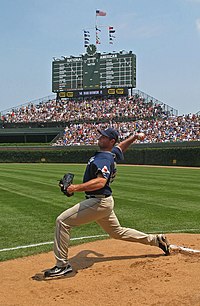
In baseball (hardball or softball), a starting pitcher or starter is the first pitcher in the game for each team. A pitcher is credited with a game started if they throw the first pitch to the opponent's first batter of a game. Starting pitchers are expected to pitch for a significant portion of the game, although their ability to do this depends on many factors, including effectiveness, stamina, health, and strategy.
A starting pitcher in professional baseball usually rests three, four, or five days after pitching a game before pitching in another. Therefore, most professional baseball teams have four, five or six starting pitchers on their rosters. These pitchers, and the sequence in which they pitch, is known as the rotation. A team's best starter is known as the ace, and is almost always the first man to pitch in the rotation. In modern baseball, a five-man rotation is most common.[1]
In contrast, a pitcher who enters the game after the first pitch of the game is a relief pitcher. Occasionally, an opener is used for only a few innings, and is replaced by a long reliever or a pitcher who would typically be a starting pitcher.
- ^ For an evaluation of the relative merits of a four-man and a five-man rotation, see Rany Jazayerli, "Doctoring The Numbers: The Five-Man Rotation, Part 3", BaseballProspectus.com (August 30, 2002).[1]